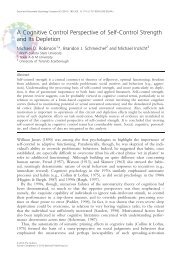Emotions and self-control 1 Incidental and Integral ... - Michael Inzlicht
Emotions and self-control 1 Incidental and Integral ... - Michael Inzlicht
Emotions and self-control 1 Incidental and Integral ... - Michael Inzlicht
Create successful ePaper yourself
Turn your PDF publications into a flip-book with our unique Google optimized e-Paper software.
<strong>Emotions</strong> <strong>and</strong> <strong>self</strong>-<strong>control</strong> 8<br />
Experiments that compare the consequences of low-intensity versus high-intensity positive<br />
emotions may also help to clarify the role of arousal in the effects of emotions on eating.<br />
Another potentially useful consideration is <strong>self</strong>-relevance. As we saw, negative emotions<br />
elicited by <strong>self</strong>-relevant threats (e.g., failure, negative feedback) tend to have different effects on<br />
eating behavior compared to other threats (e.g., threat of shock). Positive emotions can also vary<br />
in <strong>self</strong>-relevance, <strong>and</strong> it may be worthwhile to ask whether flattery, task success, or other <strong>self</strong>-<br />
enhancing events have different effects on eating <strong>self</strong>-<strong>control</strong> compared to viewing funny videos.<br />
Self-relevant positive emotions may be more intense or arousing than other positive emotions.<br />
Conclusion<br />
Having reviewed the evidence that emotions disrupt the <strong>self</strong>-<strong>control</strong> of eating behavior,<br />
the next question is: Why do emotions have this effect? The short answer is that no single<br />
explanation or theory has emerged to explain the relevant evidence. In the next section of the<br />
chapter, after considering the impact of emotions on another classic form of <strong>self</strong>-<strong>control</strong>, we will<br />
review the leading explanations for the effects of emotions in more detail.<br />
<strong>Incidental</strong> Effects of <strong>Emotions</strong> on Delay of Gratification<br />
Delay of gratification occurs whenever a person foregoes short-term satisfactions in the<br />
pursuit of more distal rewards. Dieting can be seen as delay of gratification (e.g., restraint now to<br />
fit into a swimsuit next summer), but delay behavior is more general than dieting insofar as<br />
virtually any gratification can be delayed. How do emotions influence delay of gratification?<br />
Here we focus on evidence from experiments in which emotional states were induced prior to a<br />
measurement of delay of gratification.<br />
Effects of emotions on delay of gratification in children



